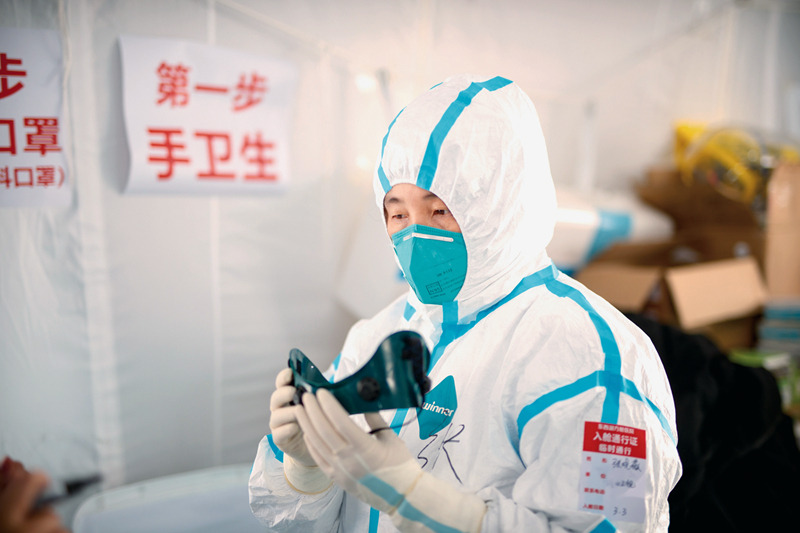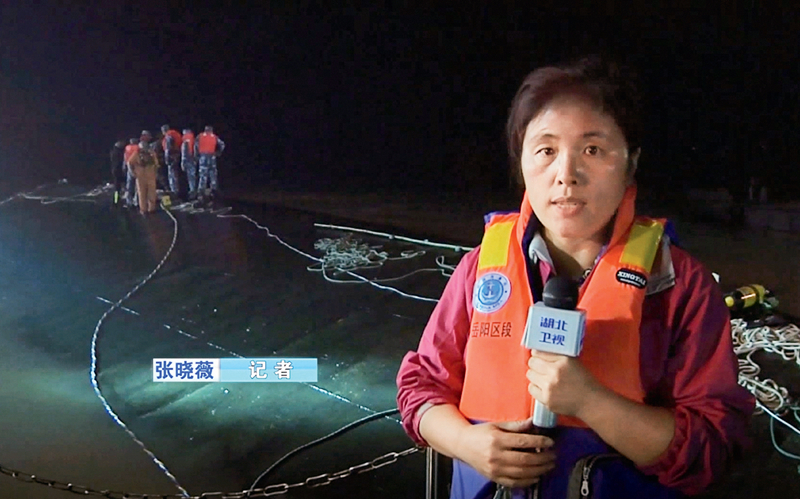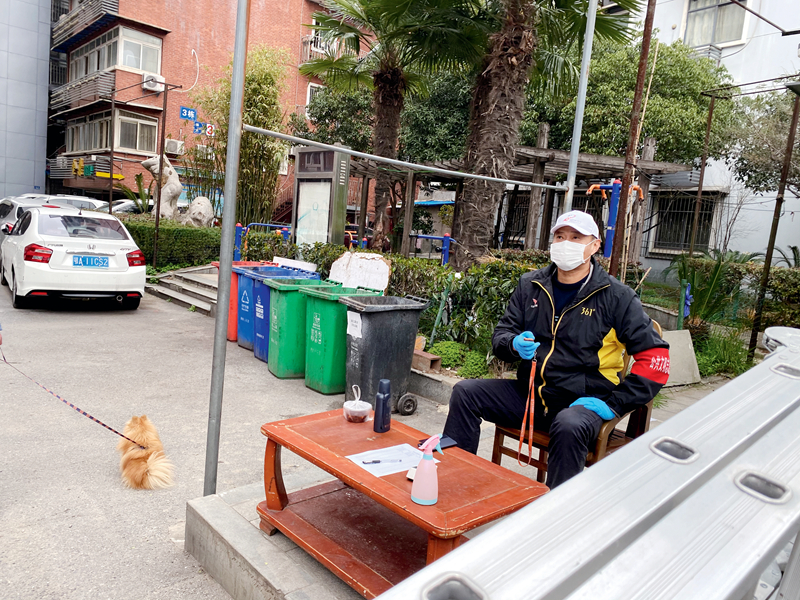Fighting on Different 'Battlefields'
 |
|
Zhang Xiaowei puts on her protective suit carefully, every time before she enters a temporary treatment center or an isolation ward for interview. |
Zhang Xiaowei, a reporter, wife and mother, lives in Wuhan, in Central China's Hubei Province. Zhang's husband and son are beach volleyball coaches. Zhang has a "daughter," whom she met during an interview 10 years ago. Since the outbreak of the novel coronavirus disease (COVID-19) epidemic, just before Chinese New Year, Zhang and her family members have played various roles — on different "battlefields" — in fighting the epidemic.
Zhang works at the TV news center of Hubei Media Group. Her husband, Lu Cheng, a retired volleyball player, currently coaches Hubei provincial men's beach volleyball team. Their son, Lu Yuliang, considers his father a role model. Lu Yuliang is also a beach volleyball coach, under the sports bureau of Wuhan's Jiang'an District.
 |
| Zhang Xiaowei doing a report. |
The Change
"Since our fight against the novel coronavirus epidemic started, ahead of this year's Spring Festival, a change has taken place in my family. The change is that we have more time together while having our dinner, every day. Due in part to my job, I usually do not have much time to take care of my son at home. He calls himself the 'left-behind child' of my family," Zhang says.
The family has a tradition; like most Chinese families, Zhang and her husband invite their parents to have a big family dinner on Chinese New Year's Eve, almost every year. This year, however, the situation was different. Zhang, her husband and their son had dinner without the extended family. Zhang said it was the first time in two decades she had such a small family gathering on Chinese New Year's Eve. It was also on Chinese New Year's Eve that Zhang was assigned to report on Wuhan's fight against COVID-19.
Since late January, Zhang has been busy reporting on the efforts to eradicate the disease. For example, she has entered isolation wards, or the so-called virus-polluted "red zone," to complete interviews. She has also been to temporary treatment centers and residential communities, which have patients who have a fever. Zhang seldom tells her husband and son that she has been to those "dangerous" places, as she does not want to worry them. It was not until the news program was about to air a segment, with her conducting an interview in a temporary treatment center, that Zhang finally told her husband and son about her assignments.
"Before the program was broadcast, I told my husband and son the story of a policeman, who worked in the temporary treatment center. The policeman's name is Wang Hengfeng. Wang met his father, unexpectedly, when he was working in the center. His father was one of the patients. Wang could not spare the time to look after his father when he was at his post. His father did not complain. Instead, he asked Wang to concentrate on his work," Zhang recalled. She also told her husband and son that no matter how dangerous her job seemed to be, as a reporter, she had to finish her tasks by reporting on the front line.
Lu Cheng and Lu Yuliang support Zhang's decision. They take turns cooking delicious food at home, so Zhang can enjoy her dinner and have a good rest after she returns home every day. In February, Lu Cheng and Lu Yuliang both joined the volunteers' group responsible for helping to secure residential communities in Wuhan. Zhang posted a message on her WeChat Moments on February 15. She wrote: "My son put on his mask and volunteer's armband. He looked calm and he was determined to safeguard his own 'battlefield'."
 |
|
Lu Cheng joins the volunteers' group to help protect residential communities in Wuhan. |
Understanding Each Other
During Lu Yuliang's childhood, it was not easy for his parents to stay at home, especially for lengthy periods, to take care of him. Both of his parents were quite busy with their work. Lu Yuliang began attending boarding school when he was a primary school student. He returned home once every week. His father, Lu Cheng, spent more than six months a year leading his team during training and/or competitions outside Wuhan. Even when Lu Cheng was in Wuhan, he rested only one day a week. After Lu Yuliang entered middle school, Lu Cheng began spending more time looking after his son, and the elder Lu began shopping at food markets and improving his cooking skills.
Lu Yuliang admires his father very much. Influenced by his father, Lu Yuliang decided to become a beach volleyball coach. Lu Cheng has taught his son how to lead a team, and how to arrange training sessions. Lu Cheng treats the members of his team as if they were his children. He tells Lu Yuliang it is important to show "love" to members of his team, and to consider the team as a "family." Now, some of the players of Lu Yuliang's team are attending college. They like to call Lu Yuliang "Coach Lu Junior," and they visit him when they return to Wuhan during a school vacation.
Zhang tells her son it is important to shoulder his responsibilities as the team's leader. In 2016, many places in Hubei Province were ravaged by floods. Zhang went to several of the areas to report on the flooding. At that time, Lu Yuliang was leading his team during training in preparation for a provincial youth beach volleyball game. The school, where the team was training, was flooded. Lu Yuliang quickly transferred his students to a safe place. "My parents have told me no matter what the circumstances, I must give priority to the safety of my students," Lu Yuliang says.
Fourth Member
Zhang's family welcomed a new member in 2010. In early February that year, Sun Shuilin, a businessman who managed a construction project, drove from North China's Tianjin Municipality to Wuhan, his hometown, to pay migrant workers who had participated in the project. However, Sun Shuilin and four of his family members died in a car accident on their way to Wuhan. Despite coping with the deep sorrow, Sun Shuilin's younger brother, Sun Donglin, paid the migrant workers on time, and he ensured they could take their earnings back to their homes before the Spring Festival. Sun Shuilin and Sun Donglin were praised by the public as "brothers of honesty."
When Zhang was reporting on the brothers' story, she met Sun Yun, Sun Shuilin's daughter, who was orphaned when her parents and three siblings died in the accident. At the time, Sun Yun was younger than 20. Zhang invited Sun Yun to her home. Lu Cheng and Lu Yuliang both said they were willing to look after the new member of their family. Sun Yun established her own family after she married in 2016. Now, she has a lovely daughter.
Zhang's family was awarded a "most beautiful family" of Hubei Province in 2018. During the ceremony, Zhang was busy on assignment, and Lu Cheng was traveling with his team at a competition outside Hubei. Lu Yuliang and Sun Yun had a discussion, and they decided Sun Yun would attend the ceremony and receive the award on behalf of the family.
Last year, Zhang's family was named a "National Most Beautiful Family." The family is still doing its part to spread warm and positive energy in Wuhan, a heroic city to be remembered — for its fight against COVID-19 — in the extraordinary year of 2020.
Photos Supplied by Zhang Xiaowei
(Women of China English Monthly April 2020 issue)
Please understand that womenofchina.cn,a non-profit, information-communication website, cannot reach every writer before using articles and images. For copyright issues, please contact us by emailing: website@womenofchina.cn. The articles published and opinions expressed on this website represent the opinions of writers and are not necessarily shared by womenofchina.cn.






.jpg)

 WeChat
WeChat Weibo
Weibo 京公网安备 11010102004314号
京公网安备 11010102004314号